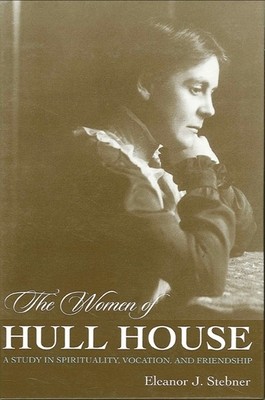
- We will send in 10–14 business days.
- Author: Eleanor J Stebner
- Publisher: State University of New York Press
- ISBN-10: 0791434885
- ISBN-13: 9780791434888
- Format: 15.1 x 22.8 x 1.8 cm, minkšti viršeliai
- Language: English
- SAVE -10% with code: EXTRA
Reviews
Description
This group biography explores the lives, work, and personal relations of nine white, middle- and upper-middle-class women who were involved in the first decade of Chicago's premier social settlement. This "galaxy of stars"--as they were called in their own day--were active in innumerable political, social, and religious reform efforts.
The Women of Hull House refutes the humanistic interpretation of the social settlement movement. Its spiritual base is highlighted as the author describes it as the practical/ethical side of the social gospel movement and as an attempt to transform late nineteenth-century evangelical and doctrinal Christian religion. While the women of Hull House differed from one another in their theological beliefs and were often critical of orthodox Christianity, they were motivated by Christian ideals. By showing the interconnections of spirituality, vocation, and friendship, the author argues that individual actions for social changes must take place within communities which provide a level of uniting vision yet allow for diverse actions and viewpoints.EXTRA 10 % discount with code: EXTRA
The promotion ends in 23d.13:43:18
The discount code is valid when purchasing from 10 €. Discounts do not stack.
- Author: Eleanor J Stebner
- Publisher: State University of New York Press
- ISBN-10: 0791434885
- ISBN-13: 9780791434888
- Format: 15.1 x 22.8 x 1.8 cm, minkšti viršeliai
- Language: English English
This group biography explores the lives, work, and personal relations of nine white, middle- and upper-middle-class women who were involved in the first decade of Chicago's premier social settlement. This "galaxy of stars"--as they were called in their own day--were active in innumerable political, social, and religious reform efforts.
The Women of Hull House refutes the humanistic interpretation of the social settlement movement. Its spiritual base is highlighted as the author describes it as the practical/ethical side of the social gospel movement and as an attempt to transform late nineteenth-century evangelical and doctrinal Christian religion. While the women of Hull House differed from one another in their theological beliefs and were often critical of orthodox Christianity, they were motivated by Christian ideals. By showing the interconnections of spirituality, vocation, and friendship, the author argues that individual actions for social changes must take place within communities which provide a level of uniting vision yet allow for diverse actions and viewpoints.

Reviews